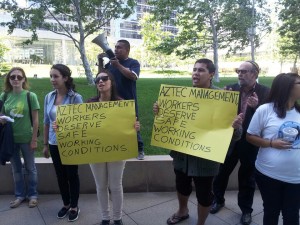Violence rests heavy in the mythological and religious womb of our civilization. The first murder happens just verses after Adam and Eve leave the Garden of Eden. According to legend, Cain was stunned after he struck and killed Abel, as death had not yet inhabited the world. He was literally at a loss as to what to do. The birds taught him about how to bury the body.
Violence has never left us from that wayward moment. However, our biblical religions do not glorify the violence. When God commanded Israel to build a Tabernacle so that God might rest amongst the people Israel, part of the package was that the altar would not be hewn with metal. Metal brought death in the form of swords and the altar was a symbol of life. Death would not bring life. If a priest fought in a war, even a commanded war, a righteous conflict, he was forbidden to do the Temple service if he had taken life. King David was not allowed to build the Temple because his hands were bloodied.
The Torah might sanction war and violence in limited cases (self defense, perhaps), however even sanctioned violence is not glorified. Extinguishing the life of a person, even an enemy, even a bad person, is still an act of evil. Continue reading

